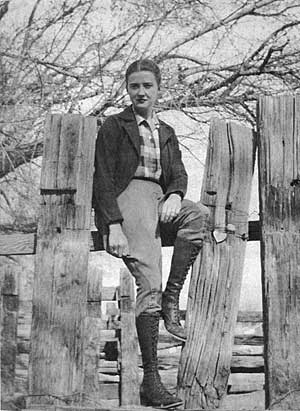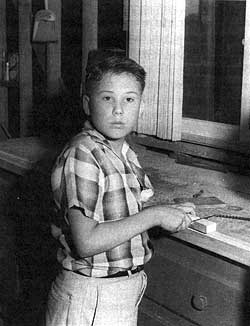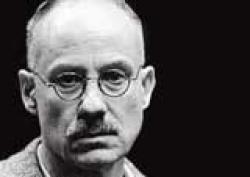Motion pictures pervade the culture far more broadly and immediately than books. It’s a quick-march progression of advance publicity and saturation screen-time. My signature novel will now be a film in wide release. The film will possibly expedite book sales in career-unprecedented numbers. Because of the film, more people may read The Black Dahlia than have read all my other books to date. This affords me a narrative opportunity of stern moment. I will gratefully capitalize on it here. A personal story attends both novel and film. It inextricably links me to two women savaged eleven years apart. These women comprise the central myth of my life. I want to honor them both. I want this piece to redress imbalances in my previous writings about them. I want to close out their myth with an elegy. I want to grant them the peace of denied disclosure and never say another public word about them.
My mother’s name was Geneva Hilliker. She dropped the “Ellroy” when she renounced my father. I laud her repudiation and commend her desire to live without a male-surname appendage. She haunts me in deep and unfathomable ways. I often travel her life at a brisk or painstakingly slow mental speed. I start in rural Wisconsin and end on an access road in L.A. The in-between stops are often filled with conjecture. I lived with her for ten years. The passage of time marks my childhood memories suspect. I later granted her a rich dramatic status and further distorted my memory. I did not know her in life. I am determined to know her in death. Summaries of her forty-three years often provide insight. Brevity enhances my process of refraction.
She grew up near the Minnesota border. Tunnel City was summer green and winter dead-tree barren. Her father was an alcoholic game warden prone to violent fits. Her mother was frail and lovely. Her younger sister worshipped her flat-out. A cemetery sits near her birthplace and the now-boarded church she attended. I’ve visited it several times. My ancestry is framed in the bulk of the gravestones. Hilliker, Woodard, Linscott, Pierce, Smith. Farmers and Protestant clergy. A British-American bloodline of longing and hurt that I will never know and will always sense in genetic code.
 |
|
| Geneva Hilliker shown in the prime of her youth. (Photo courtesy of James Ellroy.) |
She had striking dark red hair. She was the most beautiful girl in Tunnel City. Her aunt Norma Hilliker was the most beautiful woman. She blew out of Tunnel City at nineteen. She looked back only at leisurely whim. Aunt Norma put her through nursing school in Chicago. She took to city life and succumbed to fleshpot temptations. She drank to excess. She had youthful liaisons. She won a beauty contest and waltzed through a Hollywood screen test. She returned to Chicago. She learned she was pregnant. She tried to abort herself and hemorrhaged. She had an affair with the doctor who patched her up.
She went from “Geneva” to “Jean.” She tied her hair back in a frumpy do and wore it with imperious confidence. She married and divorced a sporting-goods heir in fast measure. She traveled with a much older lesbian sidekick. She moved to L.A. and broke up my father’s first marriage. They moved in together. They lived three miles from the Black Dahlia dumpsite in 1947. They read about Betty Short and thought about Betty Short and talked about Betty Short in ways that I will never discern.
I was born in ’48. My mother held down nursing jobs and provided support through my father’s feeble stabs at employment. They divorced in ’55. She considered my father weak, fanciful, and duplicitous in small ways. She was right. He considered her a drunk and a whore. He failed to acknowledge her competence and dutiful nature. She was Midwestern-Calvinist rectitude and Saturday night cut-loose-girl. She lived in that misalignment. It engendered a desperate unhappiness and killed her.
She met a man. She met him that Saturday night or knew him from before. She was drunk. She said “Yes” or “No” or “Maybe” or some encoded combination. She said “No” finally. He raped her and killed her. It was June 22, 1958.
My bereavement was complex and ambiguous. I lived in her sensual thrall and doted on my permissive father. She was strict. Church was a firm mandate. I caught her in bed with men. I lived for naked glimpses. I hated her and lusted for her and got my wish of her dead.
Her death corrupted my imagination. My reading focus turned to crime stories. My father bought me Jack Webb’s book The Badge for my eleventh birthday. It contained a piece on the Black Dahlia murder. Jean Hilliker and Betty Short—one in transmogrification.
I could not openly grieve for Jean. I could grieve for Betty. I could divert the shame of incestuous lust to a safe lust-object. I could dismiss Jean with a child’s callous heart and grant a devotional love to Betty.
Jean led me to Betty. Betty led me to Jean. The initial fusing was sharply brief. The sustained process has been attenuated. It’s a torch song with no crescendo and diminishing chords. It’s a near-fifty-year transit that demands these final words of explication.
I spent the next seven years with my father. I defamed my mother to please him. I grew up hungry for women. I stalked rich neighborhoods and spied on happy families in big houses. I spun Betty Short fantasies. I cast myself in savior and avenger roles. I broke into houses and scoured lingerie drawers. I was born to think single-mindedly and live obsessively. Jean. Betty. Sex. Crime and all its social corollaries. The astonishing conjunctions of deep romantic love—hopeless and hopeful—in fierce men and women.
My father died in ’65. I spent the next twelve years in a near-insane spiral. I cleaned up at 29. I wrote six good novels and crashed Betty and Jean with The Black Dahlia.
It was a salutary ode to Elizabeth Short and a self-serving and perfunctory embrace of my mother. I acknowledged the Jean-Betty confluence in media appearances and exploited it to sell books. My performances were commanding at first glance and glib upon reappraisal. I cut my mother down to sound-bite size and packaged her wholesale. I determined the cause of my ruthlessness years later.
She owned me. Her claim rankled. I wanted to portray myself as a man above all Oedipal constraints. I had created a fictional Elizabeth Short to usurp my mother’s claim and upstage her. It worked in the novel. It sold a great many books. It left Jean Hilliker still dead on that roadside, unblessed with love.
My moral debt to Jean remained. My moral debt to Betty, too.
I saw my mother’s homicide file in 1994 and wrote a magazine piece about it. I expanded the piece into a memoir entitled My Dark Places. The book was my mother’s biography, my autobiography, and the story of my unsuccessful search to find her killer. I addressed my exploitation and gave her to the world with diligence and blunt finesse. It was candor as expression-of-love and a long-delayed bestowal of honor. I erred only in one manner. I possessed no prophetic gifts. I could not predict the extent to which my mother would shape-shift inside me. I could not predict the influence of two extraordinary women.
They changed me. They constellated and derailed my obsessiveness. They taught me to love with a lighter touch. They convinced me to pull Jean back from my personal dramatic arc and let her rest still in my heart.
“Cherchez la femme, Bucky. Remember that.”
A prophecy. An obsessed cop’s words to a friend and rival. An indictment and celebration of male ardor. A soft breath in ellipsis.
Jean. Betty. Helen and Joan. Slow, now—go at this softly.
* * * *
Baby, who were you? How would you grow and who would you love?
Elizabeth Short was born in Boston in 1924. She had four sisters. Her home life shattered early. She left town a la Jean Hilliker and rarely looked back.
She roamed south and west. She landed in postwar L.A. She nursed a widespread and undiscerning crush on young servicemen. She was a more decorous James Ellroy crouched outside bedroom windows.
She was not a porno-film actress or a film-noir succubus. She was not promiscuous by any sane standard. She was a pie-faced Irish girl with bad teeth and asthma. She died at twenty-two. The L.A. Herald called her a “Romance Seeker.” Her last months were a disordered grasp for selfhood and love. I revere her for that. I underestimated her love-hunger in my book. I couldn’t feel it then. My own love-hunger blunted me to the real her. I failed to comprehend the force of her pure and headstrong youth.
I survived my youth. Betty didn’t. That gap defines my debt to her. My gender and native street circumspection spared me the abyss. Betty led with a callow heart. Yearning and a silly girl’s trust took her down. I tried to poise my book between sordidness and goodness. Readers will decide the balance for themselves, in ways I can never assess. I think I know Betty more completely now. I believe her balance tips to goodness in a most fulsome way. A disproportion exists in my portrayal. I filtered the fictive Betty through my own urgent lust. That lust has raged and diminuendoed in the twenty years from book to film. Betty Short was indestructibly hopeful. Her destruction resulted from it. That stands as her tragedy.
Motion pictures pervade the culture far more broadly and immediately than books. Betty was movie-mad and might have sensed this. She had actress dreams. She dressed and coiffed herself with dramatic intent. She killed time in Hollywood movie theatres and subsisted on snack-bar food. She told whopping lies with no small flair. She concocted grand love affairs with doomed army pilots and stillborn babies. Her stories showed her as the focal point of big lives in duress. She achieved prophecy in that manner. She practiced the conjuror’s art. She envisioned herself as storm center and made her lies come true.
 |
|
| Ellroy as a boy, taken moments after learning of his mother’s death. (Photo courtesy of James Ellroy.) |
I followed her own lead thusly. I culled physical facts and embellished them. I structured L.A. ’47 as a passion zone subsumed by Elizabeth Short. Every life touches the Dahlia. Betty rocks definitive. Obscurity defined her life. Celebrity defines her death. Her short time span and narrow purview expand and eclipse great public events. Her ghastly end tells us there is no surcease from human horror. She ramifies in obsessive circuits. She bids artists to fuse truths and lies. I followed her lead. Brian De Palma brilliantly followed mine. My novel. His film. My world as his visual record. The Dahlia as lodestone and magnetic field and arbiter of ambiguous redemption.
De Palma’s films circumscribe worlds of obsession. They are rigorously and suffocatingly formed. No outer world exists during their time frame. Colors flare oddly. Movement arrests you. You forfeit control and see only what he wants you to see. He manipulates you in the sole name of passion. He understands relinquishment. The filmgoer needs to succumb. His films are authoritative. He controls response firmly. His hold tightens as his stories veer into chaos. He stands and falls, coheres and decoheres, succeeds and errs behind passion. He was the ideal artist to film The Black Dahlia.
Now Betty Short’s world and my world are his world. It’s a world that no other filmmaker could have created. It’s casually dangerous and invasively corrupt. It’s a boomtown populated by psychically maimed misfits running from World War II. It’s a fiend habitat. The Dahlia was meant to die here and nowhere else. The players in her drama knew relinquishment. They understood that she was bigger than they were, and that by touching her spirit she granted them transcendence. The dynamic applies to me and to Brian De Palma. She’s bigger than us. She tempted us and seduced us and beckoned us to submission. She gave us this grand strain of her endless story.
She touched two men and gave them her world and one man’s journey through it. Bucky Bleichert is a fictional cop and a doppelganger/writer-filmmaker. He’s the man writing out the great adventure of his life and the voyeur viewing sex with a camera. Bleichert is me. Bleichert is De Palma. He’s standing outside momentous events. He’s lost in scrutiny. He wants to control. He wants to capitulate. His inner life is near chaotic. He needs to impose external order to countermand his mental state. It’s Homicide Investigation as Art. He needs to take malignancy and render it something his own.
Here’s where Bleichert is solely me. He’s a torchbearer. He carries a consuming hurt and tenderness close and doesn’t care if he gets burned. Someone’s out there. It’s a She. I feel her stirring. I need to solve this crime and unlock this riddle and mark this web of circumstance as my own—so she’ll love me.
Crazed. Magnificently fatuous. Hurtful, hopeful, enraged. The reason why I wrote this novel. Misogynistic fury codified. The reason why Betty Short was killed and why I tell redemption tales aimed at women.
And why I’m a Hilliker much more than an Ellroy.
“Cherchez la femme, Bucky. Remember that.”
Josh Hartnett understood the precept. His filmic Bucky Bleichert packs that torch for someone out there. The physical Hartnett is my described Bucky and me. He’s tall, lanky, and dark-haired, with small brown eyes. Hartnett’s performance nails Bucky with no histrionic excess. He excels at projecting cognition. Bucky Bleichert is always measuring and thinking. He’s circumspect, intelligent, watchful. He’s persistent, self-protecting, and reluctantly decent. He retains a tenuous dignity as Dahlia mania consumes him. The novel is phrased as a young man coming of age in a hell of his own making. Bucky Bleichert is solely responsible for his own descent. He made specious moral choices early in life and brought a grievously flawed soul to the Dahlia. Hartnett captures that. He appears in every scene and narrates the film. He carries the film’s moral vision. He embodies a positive strain of the Hilliker code: you’re fearful, but you always go forward.
The film spins off the axis of De Palma and Hartnett. It’s a three-mode constellation: thriller/film noir/historical romance. The design is near-German Expressionist. It’s L.A./it’s not L.A./it’s L.A. seen by Dahlia fiends in extremis. The cinematographer was Vilmos Zsigmond. The production designer was Dante Ferretti. The costume designer was Jenny Bevan. The film commands you to savor every scene and revel in your visual entrapment. This textual richness symbolizes the Dahlia’s hold on us. We can never look away. She won’t let us.
Scarlett Johannson, Hilary Swank, and Aaron Eckhart backstop Hartnett. They tweak him and crowd him and push him toward his destiny. They meet him in force of performance and somehow retreat—as if they know that he had to take the ultimate fall for Betty and the story is his to tell in the end. Josh Friedman made my story Hartnett’s story and De Palma’s. The essence of my book was forcefully and luminously captured. Friedman knows that obsession is a self-referential madness commonly known as love. It liberates in the short run and finally destroys.
Love requires self-sacrifice and deference. Bucky Bleichert learns that and achieves a tenuous peace.
I knew that twenty years ago. I shaped the book around that theme. Knowledge is quite often not power. Dramatic portent does not constitute the will to change. I’m circling back to the lesson of a book I wrote at the tail end of my youth. The lesson is, change your life now.
I’ve had splendid teachers. Betty, Jean, those two other women. This essay and the film it celebrates note a conclusion. Betty and Jean continue with me. I want them to remain sans public dialogue. They’ll flourish in silence. It’s a hush they’ve earned.
My mother was nine years older than Betty. Her life span stretched twenty-one years longer. She knew more than Betty. She was a big sister. She had things to teach her. They could have been Saturday night cut-loose-girls together, before Saturday nights cut them down.
That makes Betty a Hilliker. That assigns her a plot in the cold Wisconsin graveyard where I’ll rest one day. It’s my bloodline in repose. Love God. Fear God. Seek goodness as dark forces assail you.
The novel ends with Kay Lake Bleichert pregnant. Bucky travels east for an almost certainly troubled reunion. The year was 1949. Their daughter was born in 1950. She’s 56 now. She’s a sturdy and dutiful woman with narrative gifts. She’s Jean and Betty and me. She’s a Hilliker assuredly.
I won’t state whether Kay and Bucky are still alive. I created them, so it’s my determination. I know, but I’m not telling. The Black Dahlia case continues to ramify in my silence. In that sense, it’s your call.
I would like to thank the many people who served to make my novel such a fine film. I would like to thank Helen and Joan for their greatest kindness and generosity.
“Cherchez la femme, Bucky. Remember that.”
I do. It’s God’s great gift to me and my moral bedrock. I will never forsake that pure thought.
—San Francisco, February 27, 2006
(Editor’s note: This essay appears as an afterword to a new edition of The Black Dahlia, from the Mysterious Press; published here with the permission of the author.)
Copyright © 2006 James Ellroy.







